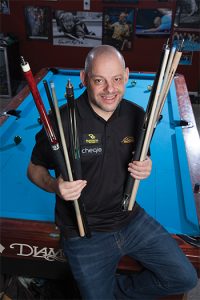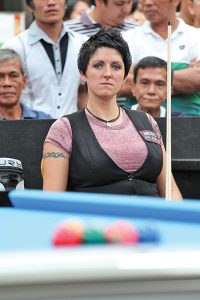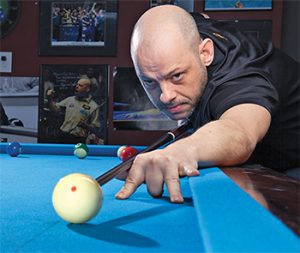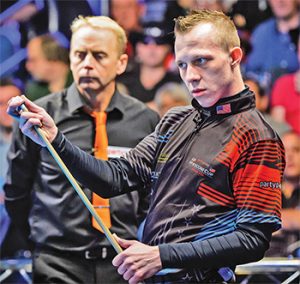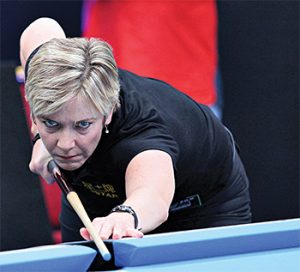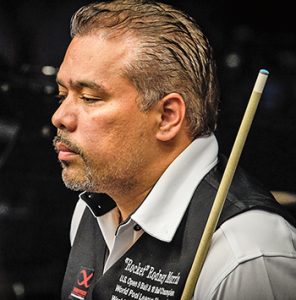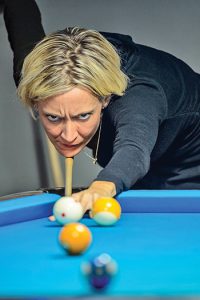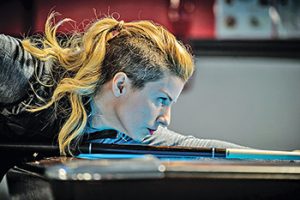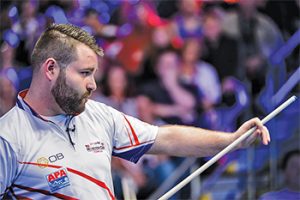Pool players have a love/hate relationship with their cues. We talk to some of the game’s best to better understand how equipment impacts performance.

Photos by Mel Evans
Pool isn’t baseball, where an inside fastball can snap a bat in half. Pool isn’t golf, where an errant drive can wind up with a driver floating in the nearby pond. Pool definitely isn’t basketball, where LeBron James might never wear the same shoe twice. Pool players and their cues have a markedly different relationship. Maybe it’s the function of the cue, as a literal extension of the human body. Maybe it’s the sheer amount of time one spends with it, hours at the table, in the airport, in the car. It’s not an exaggeration to call it an intimate relationship, even if that 20-ounce hunk of wood and leather can be a fickle partner when it’s needed the most. For the Cue Issue of Billiards Digest, we talked to nine of the best players in the world. We asked them about their preferences, about their horror stories, about any advice they might have for the average player.

Kelly Fisher
Like Allison, Kelly Fisher dominated snooker before switching to American pool. The three-time snooker world champ has won a pair of 9-ball world titles and a handful of WPBA titles in her dozen years as a pool pro.
What’s the most bone-headed thing you’ve ever done with your cue(s)?
I once left my cues circling on the conveyor belt at the airport. I didn’t even realize I had left them there until I got home three hours later.
Do you remember your first “real” cue? What was your favorite thing about it?
I’ll never forget it. I was 13 or 14 years old. My dad took me to a custom cuemaker and I was allowed to choose it all by myself, whatever I wanted.
Do you have a particular horror story that comes to mind?
When I arrived at the 2015 Women’s World 9-Ball Championship in China, I went to practice the night before, only to find my tip was half off. I got my spare shaft out of my bag and, I have no idea how, but that tip was also hanging off. One of the players helped me reattach the tip, but the uncertainty was in the back of my mind. (Editor’s note: She finished in ninth place.)
Do you have any unique maintenance habits?
I don’t clean my cue. I actually don’t do anything to it — and I like it dirty.
Do you have any superstitions with your cues?
I take them out and put them back in my case in the same place and order.

Darren Appleton
In the decade since “Dynamite” made the switch to American pool from its English counterpart, he has won world 9-ball and 10-ball titles, two U.S. Opens and seven Mosconi Cups as a part of Team Europe.
What’s the most bone-headed thing you’ve ever done with your cue(s)?
In 2005, I lost, 9-8, on the TV table in the quarterfinal of the World 8-Ball Championship (in English pool). On the way out of the arena, I put my 10-year-old craftsman ash one-piece cue over my knee. I broke it right in half and threw it in the corner. Afterward, I was a little unhappy since that cue was like my right arm. I couldn’t find a good cue for the next two years. Nothing made me happy. I was never the same player again. Then, in 2007, I switched to American pool, so that was my savior really.
Do you remember your first “real” cue? What was your favorite thing about it?
My first cue was a Riley two-piece when I first started, around 1991 or so. I loved it because Stephen Hendry, the world snooker champion, used a Riley. I thought it was the best cue ever, even though it was worth all of $30. But Hendry won his seven world titles with a $30 cue, which is pretty amazing.
What, if anything, does a cue say about a player?
I don’t think it says much. My favorite color is red, so I’ve had a few of those.
What’s the most difficult thing about switching cues?
What kind of mental obstacles do you face?
Switching cues in English pool is very difficult, because no two ash cues are the same. But American cues are made of maple, so a lot of brands are pretty much the same. It’s more like golf clubs.
What’s the most common misconception among players in terms of tip maintenance?
Most amateurs don’t have a clue about their tips. Really, if you just have a nice dome shape, you should be good. But having the right tip is important. A player with no cue power should be using a soft tip and a player with a lot of power should be using a medium or hard tip.

Justin Bergman
One of the best young players in the United States, Bergman is dangerous in all of pool’s disciplines, while also being a dangerous barbox player. The Illinois native has represented Team USA three times in the Mosconi Cup.
Do you remember your first “real” cue? What was your favorite thing about it?
My first cue was a Dufferin, one of those made for little kids. My first normal cue was a McDermott — it was all red with a black snake on it.
Do you have any unique maintenance habits?
I never do anything to my cue except replace the tip.

Allison Fisher
It’s not often “Hall of Famer” is an understatement. The “Duchess of Doom” is arguably the greatest woman to ever pick up a cue. She’s a four-time world champ, 40-time winner on the WPBA tour and 11-time world champ in snooker.
Do you remember your first “real” cue? What was your favorite thing about it?
My first cue was a gift. It had a screw-on tip.
What’s the most difficult thing about switching cues?
What kind of mental obstacles do you face?
The difficult part is adjusting to the deflection and throw between cues. I can adjust pretty quickly because I am a feel and method player. I pay close attention to what happens to the path of the cue ball. The mental obstacle is the different feel of the hit.
Do you have any pet peeves about how other people handle cues (your or theirs)?
I don’t like it when people bang their shaft into balls to gather them for shots. I sometimes let people shoot with my cue, but I have to know they respect cues before I do. I observe what they do with their own. I don’t like people picking up my cue without my permission.

Thorsten Hohmann
The German now residing in Florida has nearly done it all in his career. “The Hitman” has won a pair of world 9-ball titles, a straight-pool world championship and $350,000 for his win at the International Pool Tour’s North American 8-Ball Championship.
What’s the most bone-headed thing you’ve ever done with your cue(s)?
I once made the mistake of wanting the front end of my cue to be heavier. I had a friend add an ounce of weight right behind the ferrule. It created so much deflection that when I put sidespin on the ball, I missed the object ball entirely.
Do you remember your first “real” cue? What was your favorite thing about it?
It was blue.
Do you have a particular horror story that comes to mind?
I once left my cue at a Guinness Beer booth during an event in Indonesia. It was my birthday, so I went to celebrate in a different part of the mall. When I went back to pick up my cues and go play, I realized someone had poured Guinness down the pipes of my case. The shaft had expanded and everything was filthy, wet and stunk like beer. I had to get all new equipment.
A good carpenter never blames his tools, but do you remember a time it was definitely your cue’s fault?
It’s always the cues fault—unless it was the crooked table, the very bad roll, the sharking opponent, the terrible lighting, the annoying spectator or the wind gust that made me miss.

Rodney Morris
“The Rocket” is one of the game’s most explosive players. The 1996 U.S. Open Champion and BCA Hall of Famer has dozens of titles and has represented Team USA in the Mosconi Cup 10 times.
What’s the most bone-headed thing you’ve ever done with your cue(s)?
The most bone-headed thing I did with a cue was grab my whole case and throw it across the room after losing in the World 9-Ball Championships in 2004. The best part was that it was a soft case! Very lucky that all my cues didn’t snap.
Do you remember your first “real” cue? What was your favorite thing about it?
The first real cue was a Barry Szamboti. I love everything about it — the feel, the hit, the sound. I knew right away I had something special in my hands.
Do you have a particular horror story that comes to mind?
I remember playing in a big match when my tip flew off right in the middle of a shot. I didn’t have another shaft, so I just quit.
Do you have any unique maintenance habits?
I don’t do any of my own maintenance on my cues except for scuff or tap the tip when I feel it needs it. I never learned how.
What’s the most difficult thing about switching cues? What kind of mental obstacles do you face?
There was a 15-year stretch where it seemed like I used a different cue about every six months. The hardest part is learning the deflection on slow spin shots — and they always come up when it’s hill hill! Mentally, you’re in big trouble at that point.
What does a player need to consider before switching to a low-deflection shaft?
Before switching, you need to try it out. A cue should fit you right away. It shouldn’t mean you have to adjust to it.
Do you have any pet peeves about how other people handle cues (your or theirs)?
I hate the way some people chalk their cues if they make a loud squeaky sound. That irritates the hell out of me. Or when they drag their cue around behind them when they walk around the table.

Monica Webb
A perennial top-10 player on the women’s tour, Webb has won two WPBA titles. She currently runs her own poolroom in Georgia while continuing to compete at the highest levels.
What’s the most bone-headed thing you’ve ever done with your cue(s)?
I once slammed the ivory butt of a cue once. The [bumper] was worn down, so it cracked all the way up.
Do you remember your first “real” cue? What was your favorite thing about it?
It wasn’t a “real cue” but when I was 8 years old, I kept my own house cue behind the bar. I got my own cue when I was 9 or 10. It was my favorite — being able to have a proper cue and get more consistent.
Do you have any unique maintenance habits?
I don’t clean my shaft much at all, but my ferrule needs to be clean.
What, if anything, does a cue say about a player?
Beyond something flashy versus simple and conservative, I think it might say something about a personality, but it doesn’t say much about the player.

Jennifer Barretta
New York’s own has been long been among the elite women in the U.S. She also starred in Tru TV’s “The Hustlers” and is a regular on the Women’s Professional Billiard Association tour.
What’s the most bone-headed thing you’ve ever done with your cue(s)?
All of my bone-headed things I’ve done have been at the table. The mishaps and mistakes were definitely not the cue’s fault. No cues were injured in the making of my career.
Do you remember your first “real” cue? What was your favorite thing about it?
I remember my instructor telling me about the Predator shaft when it first came out. I knew nothing about pool, but I sure did like the name.
Do you have any unique maintenance habits?
I never clean my cue. Other players touch it and cringe.
What, if anything, does a cue say about a player?
Flashy? They are the players with flashy games. Subdued and technical? Their game matches. Very expensive and filled with inlays? Play them for money. They usually suck.
What’s the most difficult thing about switching cues? What kind of mental obstacles do you face?
I’m not a fan of switching cues. You put so much trust in this instrument that you play with. How can I trust a stranger?
Do you have any superstitions with your cues?
Sometimes when I’m having a good tournament, I find myself “making them comfortable” in the hotel room—laying them on the sofa, making sure they’re out of harms way, ridiculous stuff like that. I think they appreciate it, though!
What does a player need to consider before switching to a low-deflection shaft?
That they won’t miss as much. Consider your decision very carefully!
A good carpenter never blames his tools, but do you remember a time it was definitely your cue’s fault?
I was sponsored by a new cue company right after I came off a very long break. I stuck it out because I thought I had forgotten how to play. That sponsorship ran out and I started playing with my Lucasi Hybrid. It was like night and day the moment I put it in my hands. Definitely the cue’s fault.

Mike Dechaine
A mercurial talent from Maine, “Fireball” has used his powerful stroke to take a place among the best in the U.S. The four-time Team USA member in the Mosconi Cup also starred alongside Barretta in Tru TV’s “The Hustlers.”
What’s the most bone-headed thing you’ve ever done with your cue(s)?
Wow, there are so many things I’d like to take back when it comes to cues. My biggest mistake was switching from something I really liked. When you get used to something, keep it. Also, I’ve changed tips in the middle of tournaments when I was playing perfectly fine. I do not recommend doing that.
Do you remember your first “real” cue? What was your favorite thing about it?
My first “real” cue was a McDermott my father gave me. It was simple but played extremely well. It was before I knew anything about high or low deflection. I actually still have this cue, so maybe I’ll dust it off and start playing with it again.
Do you have any unique maintenance habits?
Most everything about my equipment is straightforward. I use a specific tip, taper, like my shaft smooth but dirty and prefer a forward-balanced cue. Some have commented on my unique chalking habits. Personally, I don’t see what’s wrong with it, but I guess it’s strange from what I’ve heard.
What, if anything, does a cue say about a player?
For me, all I care about is if the cue plays well. It could be the ugliest looking thing in the world, but if it hits good, it’s in my bag.
A good carpenter never blames his tools, but do you remember a time it was definitely your cue’s fault?
I’d like to say every time, but we all know that’s not the case. One situation I wish I could take back was a week before the 2015 Mosconi Cup when my ferrule cracked. This was heartbreaking for me because I was playing excellent when this all happened. That time, it was 100% the cue’s fault!
Fill in the Blank
The most important single thing about a cue is _____.
Kelly Fisher: You trust it.
Monica Webb: The shaft.
Jennifer Barretta: The shaft.
Darren Appleton: The tip.
Rodney Morris: The hit.
Allison Fisher: The balance.
Justin Bergman: The tip.
Nickel- or dime-shaped tip?
K. Fisher: Dime.
Webb: Nickel.
Barretta: Nickel. I get too much spin with a dime.
Appleton: Nickel.
Morris: Dime.
I’m especially aware of my cue’s _____.
K. Fisher: Crisp hit.
Webb: Wrap.
Barretta: Balance.
Appleton: Tip.
Morris: Tip hardness.
A. Fisher: Balance.
Players who name their cues are _____.
K. Fisher: Odd.
Webb: Goofy.
Barretta: Lonely.
Appleton: Bipolar.
Morris: Participation-trophy kids.
Bergman: Strange.
A. Fisher: Interesting.
When I’m walking with my cues/cue case, strangers most commonly mistake them for _____.
Webb: Musical instruments.
Barretta: Musical instruments.
Appleton: Guns.
Morris: Arrows.
A. Fisher: Musical instruments.
As far as its hit, the most underrated aspect of a cue is _____.
K. Fisher: Vibration
Morris: The age of the shaft wood.
Webb: The ferrule.
Appleton: Again, the tip.
A. Fisher: Weight distribution.
Bergman: The joint.
How many cues do you currently own?
K. Fisher: Three, though hundreds more if you count the ones at my pool hall, retail story and Kwikfire line of cues!
Webb: Not many. Less than five.
Barretta: They seem to accumulate, but I only own three that I actually use.
Appleton: Three.
Bergman: 10.
Morris: Just two.
A. Fisher: Quite a few, but I only play with one.
How many cues have you owned in your lifetime?
Appleton: Around 20.
Barretta: Around 20.
Morris: Hundreds.
Bergman: Hundreds.
What’s the most you’ve paid for a cue?
Barretta: $200 for my first cue.
Appleton: $100
A. Fisher: $2,500
Morris: $12,500
Bergman: A couple thousand dollars.
How much does your cue weigh? Your break cue?
K. Fisher: Both my playing cue and break cue are 19.5 oz.
Webb: My playing cue is 19 oz. and my break cue is 18.5 oz.
Barretta: My playing cue is 19 oz., my break cue is 20 oz.
Appleton: My playing cue is 19.5 oz. and my break cue is 19 oz.
Bergman: My playing cue is 18 oz.
Morris: My playing cue is 20 oz. and my break cue is 19.5 oz.
A. Fisher: My playing cue is 18.2 oz. and I don’t know what my break cue weighs.
I prefer a wrap/no wrap because _____.
K. Fisher: A prefer a wrap because it is less sticky.
A. Fisher: I like the beauty of a wrapless cue, but I prefer wraps because the lacquer can be too thick and sticky.
Webb: I like a wrap because of the grip.
Appleton: I prefer an elephant ear skin wrap for its feel.
Bergman: I prefer a wrap because my hands sweat so it gives me a better feel.
Morris: I prefer a leather wrap because I like how it grips my hand.
A good cue repairman is worth _____.
Webb: A lot! Nothing is worse than your tip falling off at a tournament or needing repair on the finish and wrap. It’s very important to me that I have the best person work on those things.
Barretta: Chaining up in your basement!
Appleton: Paying him properly for his work.
Morris: $2 million! (Approximately.)
A. Fisher: A good repairman is worth quite a bit but a good cuemaker is priceless.

